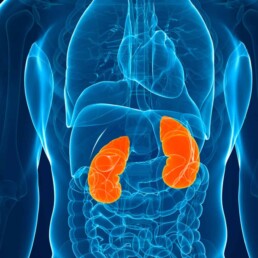L-Arginine, an essential amino acid, plays a pivotal role in various bodily functions and has been increasingly recognized for its significant impact on kidney health. This amino acid is not only crucial for protein synthesis but also offers several benefits for the kidneys, including lowering hypertension, enhancing kidney function, and reducing the risk of kidney disease. In this blog, we will explore three key benefits of L-arginine for kidney health, emphasizing its role in managing hypertension, a major concern for kidney disease patients.

By Majd Isreb, MD, FACP, FASN, IFMCP
L-Arginine Lowers Hypertension: A Gateway to Kidney Health
Hypertension, or high blood pressure (BP), is a leading risk factor for chronic kidney disease. The kidneys contain an intricate network of blood vessels that can be damaged by high blood pressure over time. L-arginine’s role in lowering hypertension is well-documented and is chiefly attributed to its ability to increase nitric oxide production in the body. Nitric oxide is a crucial compound that helps blood vessels relax and dilate, promoting better blood flow and subsequently reducing blood pressure.
Several studies have demonstrated that L-arginine supplements can effectively lower blood pressure in people with mild to moderate hypertension. For instance, This meta-analysis demonstrated that compared with placebo, L-arginine significantly lowered systolic BP by 5.39 mm Hg and diastolic BP by 2.66 mm Hg. This reduction in blood pressure is particularly beneficial for kidney health as it eases the kidney’s workload and prevents damage to the renal arteries.
On the other hand, the kidney is a major site of arginine synthesis, where citrulline is converted to arginine by the enzymes argininosuccinate synthase and lyase. The loss of kidney function and mass that occurs in chronic kidney disease (CKD) can lead to increased blood pressure. This rise in BP can be prevented by L-citrulline supplementation. This indicates that the reduction in L-arginine metabolism plays an important factor in CKD-associated hypertension.
Join us to end the kidney disease epidemic
Enhancing Kidney Function Through Improved Circulation
L-Arginine’s ability to boost nitric oxide production not only lowers blood pressure but also enhances overall circulation. Improved blood flow ensures the kidneys receive adequate oxygen and nutrients for proper functioning. Healthy blood flow helps the kidneys efficiently filter waste products from the blood and maintain electrolyte balance, which is vital for the entire body’s health.
In animal models of kidney disease, supplementing with L-arginine was found to improve glomerular filtration rate and renal blood flow after 24 hours of urinary tract obstruction. The NO system also mediated this effect.
L-Arginine and Its Protective Role Against Kidney Disease
L-arginine’s antioxidative properties protect kidney health. Oxidative stress is a major contributor to kidney disease progression and managing it can help slow its progression. L-arginine’s ability to enhance glutathione synthesis and nitric oxide production helps reduce oxidative stress by improving blood flow and nutrient delivery to the kidneys.
Moreover, studies suggest that L-arginine supplementation can help reduce kidney inflammation, which is often a response to injury or disease. Reducing inflammation can help protect kidney tissues from further damage and maintain their function. This protective role is essential for individuals at risk of chronic kidney disease, as it can help delay the progression of the condition.
L-Arginine is a Two-Edged Sword
L-arginine supplementation has shown mixed results in various kidney conditions. In animal models of glomerulonephritis, it appears harmful, likely due to increased nitric oxide (NO) production driven by higher levels of inducible NO synthase (iNOS). In humans with chronic glomerular diseases, L-arginine supplementation does not alter the progression of renal disease and should be avoided.
However, several studies have documented the benefits of L-arginine in different forms of chronic kidney disease, including after renal ablation, in cases of ureteral obstruction, diabetic nephropathy, and salt-sensitive hypertension.
Notably, L-arginine levels are decreased in preeclampsia, and recent experimental research suggests that supplementation could prevent it in high-risk pregnancies. Finally, exogenous L-arginine has demonstrated protective effects in ischemic acute renal failure.
Dosing of L-Arginine for Kidney Health
When considering incorporating L-arginine into your regimen for its potential benefits on kidney health, it’s crucial to understand the appropriate dosing. The suggested dose of L-arginine varies based on individual health needs and conditions. Generally, a common dosage ranges from 2 to 3 grams per day for adults, effectively lowering hypertension and improving blood flow.
The exact dose for kidney disease is not well established, but in general, we recommend a dose of 1-2 g per day. It’s important to consult with a healthcare provider before starting L-arginine. They can offer guidance based on your overall health profile and existing medications. This personalized approach ensures not only the efficacy of the treatment but also its safety, preventing potential interactions and complications.
A Word of Caution: Potential Risks of L-Arginine Supplementation
While L-arginine offers numerous health benefits, it is important to know the potential risks and precautions associated with its supplementation. L-arginine can interact with certain medications, including blood pressure drugs, diabetes medications, and blood thinners, potentially enhancing their effects and leading to complications such as an increased risk of bleeding or severe hypotension.
Additionally, people with certain health conditions, such as asthma, allergies, or herpes, should use L-arginine cautiously, as it may exacerbate symptoms.
As mentioned above, it is crucial to pay attention to the indication of L-arginine in kidney disease. L-arginine should be avoided in glomerulonephritis such IgA nephropathy, FSGS, and lupus nephritis. Ultimately, while L-Arginine benefits many, it should be used under the guidance of a healthcare provider to navigate these potential risks effectively.
The Bottom Line About the Benefits of L-Arginine for Kidney Health
In conclusion, L-arginine offers several benefits for kidney health, particularly in lowering hypertension, improving kidney function through enhanced circulation, and providing a protective effect against certain kidney diseases. However, it should be avoided in patients with glomerulonephritis. While L-arginine supplements are generally considered safe, it is always advisable to consult with a healthcare provider before starting any new supplement, especially for individuals with existing health conditions or those on medication.








